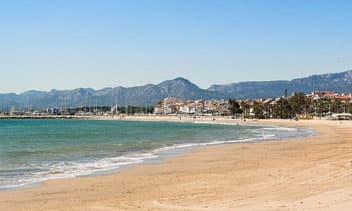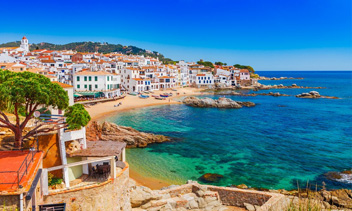
Is it Worth Buying a House in Spain?
Last update: September 25, 2024
Reading time: 11.6 min
Introduction
Spain, known for its beautiful landscapes, rich culture, and sunny weather, has become a popular destination for property buyers. But is it worth buying a house in Spain? This question encompasses various factors including financial investment, lifestyle benefits, legal processes, and market stability. In this article, we will explore these aspects to help you make an informed decision.
Benefits of Buying a House in Spain
Climate and Lifestyle
Most of the country benefits from a Mediterranean climate, characterized by hot summers and mild winters, especially along the southern and eastern coasts. Cities like Malaga and Valencia see summer temperatures averaging around 30°C (86°F) and winter lows rarely dipping below 10°C (50°F). This pleasant weather encourages a relaxed, outdoor-focused lifestyle, with locals and expats alike enjoying everything from beach days to hiking in the mountains. Live weather in Spain.
The Costa del Sol, as the name suggests, is known for its near-constant sunshine, with over 320 sunny days per year. This region, along with the Costa Blanca, offers some of the best weather in Europe, making it ideal for retirees and sun-seekers. Meanwhile, the Costa Brava and northern Spain have a slightly cooler, more temperate climate, offering a change of pace with lush greenery and milder summers.
Beyond the excellent weather, Spain’s laid-back lifestyle is complemented by its world-class cuisine and vibrant festivals. Whether it’s enjoying tapas in a lively plaza, attending famous festivals like La Tomatina or Feria de Abril, or simply soaking in the warm sun on the coast, life in Spain strikes a perfect balance between relaxation and excitement.
Overall, with its mix of sunny coastal regions and rich cultural experiences, Spain is not just a great place to visit—it’s a dream destination for those looking to live a vibrant and fulfilling life year-round.
Cost of Living
Spain offers a significantly lower cost of living compared to many other Western European countries like France, Germany, or the UK. The affordability of housing, food, and services makes it a top destination for expats and retirees looking for a high quality of life without high costs.
- Housing: Rent for a 1-bedroom apartment ranges from €400-€600 in smaller towns, while in major cities like Madrid or Barcelona, it’s typically between €850-€1,500. This is far more affordable than places like London or Paris, where similar apartments can exceed €2,000 per month.
- Utilities: Monthly utilities (electricity, water, internet) cost about €100-€150, much lower than the €200-€300 typically found in northern European countries.
- Groceries: For two people, monthly grocery costs range from €200-€400, which is significantly cheaper than in Germany or the UK, where prices are often higher due to import costs.
- Dining Out: A meal for two at a mid-range restaurant costs around €25-€35, making it more affordable than dining in cities like Paris or Berlin, where similar meals can easily cost €50-€70.
- Transportation: Metro passes in cities like Madrid and Barcelona range from €40-€60 per month, much cheaper than in cities like London or Paris, where monthly passes can exceed €100.
- Healthcare: Public healthcare is either free or low-cost, and private health insurance ranges from €50-€150 per month—well below the premiums often paid in other European countries.
In comparison to its European neighbors, Spain offers an affordable lifestyle without sacrificing quality. For a deeper look into Spain’s cost of living, visit this detailed guide: Cost of Living in Spain.

Healthcare and Education
Spain has a world-renowned healthcare system, with the Sistema Nacional de Salud (SNS) offering free or low-cost healthcare services to all legal residents. Expats moving to Spain have access to both public and private healthcare options, ensuring comprehensive medical coverage.
Key Highlights of Healthcare in Spain:
- Public Healthcare (SNS): The public healthcare system offers state-funded services, including access to general practitioners, specialists, and hospital care. Expats registered for social security can benefit from the SNS.
- Private Healthcare: Private healthcare offers faster access to specialists, shorter waiting times, and English-speaking doctors, making it a popular option for expats.
- Insurance Requirements: Expats are required to have either public or private insurance to meet residency regulations. Private insurance typically costs between €50 and €200 per month, depending on coverage.
For more in-depth information on how to access healthcare in Spain as an expat, including how to register for social security and obtain a health card, check out this comprehensive guide on Healthcare in Spain for Expats.
In addition to excellent healthcare, Spain boasts a strong educational system that caters well to both local and international students. Expats moving to Spain have access to public schools, private schools, and a wide range of international schools, offering bilingual or English-language education.
Key Points About Education in Spain:
- Public Schools: Public schools in Spain are free for all residents, including expats. The curriculum is delivered in Spanish, with regional languages like Catalan, Galician, or Basque used in some areas. These schools are ideal for younger children who can quickly adapt to the language and culture.
- International Schools: For families seeking education in English or other languages, Spain has a large number of international schools. These institutions follow various international curricula, including the British, American, and International Baccalaureate (IB) systems. International schools are particularly popular in major cities like Madrid, Barcelona, and Valencia, as well as in regions with large expat communities such as Costa del Sol.
- Private Schools: Many expat families also opt for private schools, which offer a mix of Spanish and international curricula, often providing a bilingual education in both Spanish and English. Tuition fees vary depending on the school and location but generally range between €4,000 and €10,000 per year.
- Higher Education: Spain has a robust higher education system, with prestigious universities such as the University of Barcelona and Complutense University of Madrid. Many universities offer programs in English, especially in fields like business, engineering, and technology, making it easier for international students to pursue higher education without the language barrier.
Financial Considerations
Property Prices
Real estate prices in Spain vary widely depending on the location. Here’s a breakdown of the trends in some of the most sought-after cities from 2020 to 2024:
- Malaga: Prices have surged from €2,118/m² in 2020 to €3,069/m² in 2024, driven by growing interest in the city as both a cultural and coastal hotspot.
- Barcelona: Despite slight fluctuations, real estate values in Barcelona remain high, increasing from €4,067/m² in 2020 to €4,528/m² in 2024. The city’s global reputation and diverse economy ensure steady demand.
- Alicante: This coastal city has seen consistent growth, with property prices climbing from €1,515/m² in 2020 to €2,133/m² in 2024. Alicante’s appeal for retirees and foreign investors keeps demand strong.
- Valencia: A remarkable surge in prices, from €1,824/m² in 2020 to €2,664/m² in 2024, reflects Valencia’s rise as a vibrant urban center with excellent infrastructure and a dynamic cultural scene.
- Madrid: As Spain’s capital and economic hub, Madrid has witnessed a stable increase in property values, from €3,619/m² in 2020 to €4,717/m² in 2024.
- Granada: Known for its historic charm, Granada’s prices have grown steadily from €1,710/m² in 2020 to €2,220/m² in 2024, offering affordable options for buyers.
For more detailed information, including price evolution in other cities such as Seville, Mallorca, and the Canary Islands, check the full analysis in the Evolution of Real Estate Prices in Spanish Cities (2020-2024) report.
Factors Influencing Real Estate Prices
Several factors contribute to the rise in property prices across Spain, especially in major cities:
- Economic Growth: Spain’s recovering economy has boosted purchasing power, increasing demand for properties.
- Tourism: Popular destinations like Barcelona, Mallorca, and the Canary Islands see strong demand for holiday homes, further driving up property prices.
- Foreign Investment: Spain remains a top destination for international property buyers seeking second homes or lucrative rental properties.
By examining these trends, you can gain a clearer understanding of where to invest and what to expect in terms of future property value growth.
Rental Income Potential
For those looking to invest, the rental market in Spain can be lucrative, especially in tourist hotspots. Short-term holiday rentals can generate significant income during peak seasons, while long-term rentals offer steady returns.

Taxes and Fees
When buying property in Spain, understanding the various taxes and fees is crucial for accurate budgeting. Whether you’re purchasing a new or second-hand home, these costs can vary depending on the region. For a detailed guide on property taxes and associated costs, check out Taxes When Purchasing Real Estate in Spain.
Key Costs to Expect:
-
Property Transfer Tax (ITP): Applies to second-hand properties, typically between 6% and 10%, depending on the region (e.g., Madrid 6%, Valencia 10%).
-
Value Added Tax (IVA): For new properties, IVA is set at 10% of the purchase price. The Canary Islands offer a reduced rate of 7%.
-
Documented Legal Acts (AJD): A stamp duty on new property purchases, ranging from 0.5% to 1.5% depending on the Autonomous Community.
-
Annual Property Tax (IBI): Paid annually, based on the cadastral value of the property, with rates between 0.4% and 1.1%.
-
Notary and Registration Fees: Expect 0.5% to 1% for notary fees and 0.4% to 0.7% for registration fees.
-
Legal Fees: Legal services typically cost 1% to 2% of the property price to handle contracts and tax compliance.
-
Real Estate Agency Fees: Typically 3% to 6% of the sale price for agency services.
For more insights, including regional differences and tax tips for foreign buyers, read the full article on Spanish Real Estate Taxes.
Legal Aspects
Legal Framework for Foreign Buyers
Spain has a well-established legal framework for foreign property buyers. Non-EU citizens have the same property rights as Spanish nationals. It is advisable to hire a local lawyer to navigate the legal process and ensure all documents are in order.
Golden Visa Program: Changing Landscape for Non-EU Investors
Spain’s Golden Visa program, introduced in 2013, has been a key residency-by-investment pathway for non-EU nationals looking to live, work, and study in Spain. The program allows residency through a minimum real estate investment of €500,000. However, recent governmental decisions signal a major shift. To stay updated on these changes and explore alternative options, you can read our article, Spain Ends Golden Visa: Exploring New Residency Options for Non-EU Investors.
Key Benefits of the Golden Visa Program (Before Its Termination):
- Residency in Spain: The right to live, work, and study in Spain.
- Free Movement: Visa-free travel across the Schengen Zone.
- Family Reunification: Ability to include immediate family members.
- Path to Permanent Residency & Citizenship: Eligibility for permanent residency and eventual citizenship after fulfilling the required residency period.
Recent Changes: Discontinuation of the Golden Visa Program
As of April 8, 2024, Spanish Prime Minister Pedro Sánchez announced that the Golden Visa program will no longer accept new applications, marking the end of one of the most popular residency-by-investment schemes in Europe. This decision aims to curb speculative real estate investments and prioritize housing accessibility for local residents. While existing visa holders can renew their residency under current conditions, no new applications will be processed moving forward.
Alternatives to the Golden Visa: Exploring New Residency Options
For non-EU nationals seeking residency in Spain, several alternative visa options remain available:
- Non-Lucrative Visa: Designed for individuals not seeking employment in Spain, requiring proof of sufficient financial means and private health insurance.
- Entrepreneur Visa: For those interested in starting a business in Spain that contributes to the local economy.
- Student Visa: For individuals enrolling in accredited Spanish educational institutions.
- Work Visa: For professionals with job offers from Spanish employers.
Application Process and Considerations
These visa alternatives involve similar documentation requirements, including proof of income or funds, a clean criminal record, and comprehensive health insurance. The Non-Lucrative Visa is particularly attractive to retirees or those with passive income, providing a stable path to residency without the need for employment.
If you’re considering relocating to Spain, it’s important to consult legal advisors to help navigate the visa application process effectively.
For more in-depth information on other residency options, check out these articles:
- Can I Live in Spain Full Time if I Buy a Property?
- Non-Lucrative Visa or No Visa? The Best Choice for Long-Term Life in Spain
Potential Challenges
Market Fluctuations
The real estate market can experience fluctuations, and property values may not always increase steadily. It’s important to conduct thorough research and consider long-term trends before making a purchase.
Language Barrier
While many Spaniards speak English, especially in tourist areas, there can still be a language barrier when dealing with legal documents and local authorities. Hiring a bilingual lawyer or real estate agent can help mitigate this issue.
Conclusion
So, is it worth buying a house in Spain? For many, the answer is a resounding yes. The combination of a high quality of life, affordable cost of living, and potential for rental income makes Spain an attractive destination for property investment. However, it is crucial to understand the financial, legal, and practical aspects involved to make an informed decision. Whether you are looking for a vacation home, a permanent residence, or an investment opportunity, Spain offers a diverse real estate market that caters to various needs and preferences.
FAQs
Is it a good time to buy property in Spain?
The real estate market in Spain has been stable, with certain areas showing significant growth. It’s always best to consult with local experts to get the latest market insights.
Can foreigners get a mortgage in Spain?
Yes, many Spanish banks offer mortgages to foreign buyers, typically covering up to 70% of the property’s value.
What are the ongoing costs of owning a property in Spain?
Ongoing costs include property taxes, maintenance, insurance, and utilities.
Is it better to buy or rent a property in Spain?
This depends on your long-term plans. Buying can be a good investment, especially if you plan to stay long-term or rent the property. Renting offers more flexibility.
What is the process of buying property in Spain?
The process includes finding a property, obtaining an NIE, opening a Spanish bank account, making an offer, hiring a lawyer, signing contracts, and registering the property.
Do I need a lawyer to buy property in Spain?
While not mandatory, it is highly recommended to hire a local lawyer to ensure all legal aspects of the transaction are handled properly.















 From Europe
From Europe From the UK
From the UK From the US
From the US